More than fourteen thousand species of mushrooms have been discovered and classified. Among this impressive number, there are an estimated three thousand edible varieties, many prized for their nutritional and medicinal properties.
In each and every bite of edible mushrooms, you’ll find a wealth of vitamins, minerals, and antioxidants. These all-important nutrients work together with the potent natural compounds and enzymes found in mushrooms to decrease cancer risks, support the immune system, improve digestive health and even protect the brain, proving that these little fungi are big powerhouses when it comes to your health.
But did you know mushrooms can benefit your dog too?

It’s true! Certain mushroom species help boost the canine immune system while helping to ease the inflammation that can cause your pup pain and discomfort. And even if your dog is fit as a fiddle, mushrooms like Shiitake, Turkey Tail, Maitake, Reishi, Chaga, and Cordyceps can do their body good!
With our Mushroom Gold Bone Broth Advanced Immune Support Powder, you can easily give your dog the benefits of bone broth and mushrooms in one easy-to-scoop formula. Your dog will love this powder for the yummy treat it brings to dinnertime, while you’ll love the boost it gives your best friend’s health.
Meet the Marvelously Morbid Cordyceps Mushroom
You’ve probably heard of many of the mushroom species in our bone broth powder, but a few don’t enjoy the same celebrity status as their fungi friends. Once you learn about cordyceps mushrooms, you’ll never forget this rare fungus with a hunger for bugs.
While we know them as cordyceps, in Chinese, they’re called DongChongXiaCao, which translates to ‘caterpillar fungus’ in English. Their Tibetan title is yartsa gunbu, translating poetically to “summer grass, winter worm.” And if you’re curious, the word cordyceps is a combination of Latin terms’ cord’ and ‘ceps’ which translates to “club head” in English.
While roughly four hundred species of cordyceps have been identified, there are two species coveted for their benefits to both people and dogs: Cordyceps sinensis and Cordyceps militaris. These two parasitic fungi species have quite interesting and terrifying origins.
Creepy Cordyceps Come Popping from Caterpillars
Let’s get weird for a second and talk about how cordyceps form. It’s not for the faint of heart, so if you’re funny about bugs, be warned, you’re about to get the heebie-jeebies!
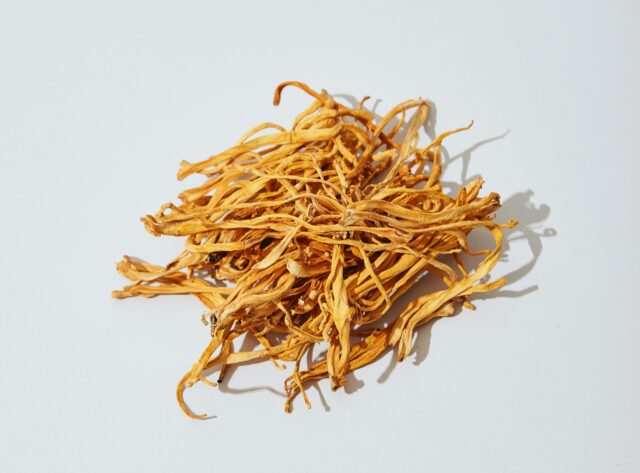
Cordyceps Sinensis and Cordyceps militaris form by invading caterpillars, spreading them through with killer filaments, and then forming the mushroom that bursts out of their heads. Sounds like something right out of a certain horror Sci-fi movie franchise, doesn’t it?
While Cordyceps militaris finds any ol’ caterpillar will do, the Cordyceps sinensis proves to be a picky parasitic fungus and only infects caterpillars destined to metamorphose into Hepilus Fabricius, also called the Ghost Moth. Found only in the high mountain regions of China and Tibet, caterpillars infected by the fungus Cordyceps Sinensis never get their chance to fly because the fungus slowly kills them and then grows the spindly mushroom so highly coveted for its many benefits.
Britt Bunyard, University of Wisconsin professor and editor of Fungi Magazine, explains, “This caterpillar will bury itself down a couple inches into the soil. Meanwhile it doesn’t know it, but this fungus is digesting it from within and then in the spring this … tissue erupts out the head.”
Ah, the cordyceps mushroom; proof that nature can be gross and amazing all at once.
Though creepy and crawly, the use of this caterpillar fungus can be traced back a thousand years in Chinese and Tibetan cultures. In addition to serving as nightmare fuel, both species of cordyceps have long been used in food and medicines to treat anything from fatigue to low libido.

The Differences & Similarities of C. Sinensis and C. Militairis
Cordyceps sinensis is one of the rarest mushrooms in the world, and with that rare status comes an exceptionally high price tag, with an ounce of wild-grown c. sinensis valued at fifty thousand dollars. It also proves vexing to cultivators, behaving like a total diva and most often refusing to grow. C. militaris, however, is an amiable alternative thanks to its willingness to cultivate in controlled settings on grain substrates and wood. Because it can be grown in labs and by mushroom specialists, cordyceps militairis costs far less than its rare relative.
And here’s another fun fact about your new favorite mushroom: Cordyceps weren’t successfully cultivated by human hands until the Institute of Materia Medica, Chinese Academy of Medical Sciences pulled it off in 1982.
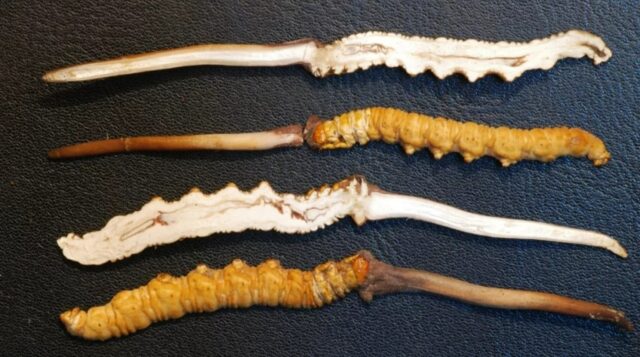
Another difference between the two species comes down to variances in the compounds adenosine and cordycepin. Quick explanation, adenosine is a chemical found in living cells that helps with certain issues in the body. Cordycepin is derived from adenosine and provides much of the same benefits as adenosine.
“The main difference between Cordyceps sinensis fungus and Cordyceps militaris is in the concentrations of two compounds: adenosine and cordycepin. Studies have shown that Cordyceps sinensis contains more adenosine than Cordyceps militaris, but no cordycepin.”
And what does this mean for the beneficial differences between the two species? Not much. Sure, one species may pack a wee bit more of a punch in aiding certain issues over the other and vice versa, but in the end, they’re both providing about the same thing—the rich benefits of cordyceps mushrooms!
Are Cordyceps Mushrooms Safe for Dogs?
But hold up! Hearing the term ‘parasitic’ used in conjunction with something for your dog, of course, prompts you to ask, “are cordyceps mushrooms safe for dogs?”
Yes! Dogs can safely consume cordyceps when they come from a trusted source or retailer. For example, you can rest assured our Mushroom Gold Bone Broth Immune Support Powder provides a safe option for giving dogs the benefits of mushrooms. But, never let your dog sniff out and eat wild mushrooms.

While there are only an estimated one hundred species of poisonous mushrooms among the 14,000 classified species, eating just a little bit of one toxic mushroom can cause illness in dogs and humans. And one more thing to keep in mind when cooking mushrooms you plan on sharing with your furry friend, avoid using seasonings like garlic, onion, chives, salt, pepper, and paprika as they are bad for dogs. And, now that you know, let’s explore cordyceps mushroom benefits for dogs!
RELATED: 20 Fruits & Veggies Your Dog Will Love!
Cordyceps Mushrooms Are Stuffed with Nutrition and Flavor
Described as having a warm sweet taste, cordyceps bring a whole picnic basket of flavor for the tongue and goodness for the body. A low-calorie food filled with healthy carbs, fat, and fiber, cordyceps provide vitamins B1, B2, B12, E, and K, and a wealth of minerals, including calcium, copper, iron, magnesium, manganese, potassium, and zinc. Cordyceps are also rich in antioxidants and sterols, a necessary ingredient in the formation of Vitamin D.
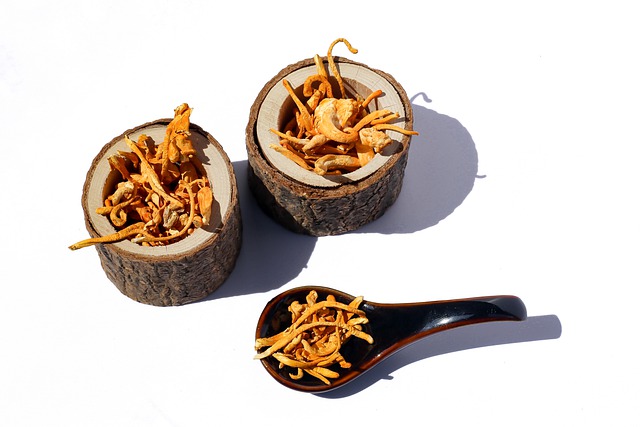
And if you’d like to whip up some dinner with cordyceps, the Utah State Intermountain Herbarium reports, “Today the most common way to prepare the caterpillar fungus is to stuff a duck with the caterpillar fungus then after boiling the duck in hot water, patients drink the liquid.”
But putting a scoop of our Mushroom Gold Bone Broth Immune Support Powder in your pup’s food is much easier than boiling a fungus-stuffed duck to give your dog cordyceps mushroom benefits!
Cordyceps Mushroom Benefits for Dogs
So, now we know cordyceps creep their way through caterpillars and contain a bouquet of nutritional benefits. But what medicinal benefits do cordyceps bring to dogs?
Studies on cordyceps have revealed the species provides anti-inflammatory and immune system benefits while aiding in the fight against canine cancer, reviving energy levels, further oxygenating the blood, lowering both blood pressure and blood sugar, and helping the heart, liver, and kidneys better operate.
With all this function and support, it’s no wonder cordyceps have found a following in those that choose to live their lives in healthy, more natural ways. And thanks to their growing popularity and the knowledge handed down through more than a thousand years of ancient medical use, cordyceps are finding themselves at the center of many research projects. And these studies reveal why ancient medical practitioners so often turned to cordyceps to restore balance and harmony to the body.
Improves Immune Function
In one study of the species, South Korean scientists gave human testers twice-daily capsules of Cordyceps extract, CBG-CS-2. After eight weeks of taking the capsules, participant blood samples revealed a 17.6 percent rise in NK cell activity from earlier baseline blood draws. NK cells are “natural killer” cells that roam the body in search of harmful invaders, and once enemies are located, the NK cells go to work and destroy them.
In conjunction with CBG-CS-2 benefits, researchers also learned that the complex carbohydrates and adenosine found in cordyceps could help strengthen the function of the immune system by increasing activity in immune cells and lowering inflammation.
Inhibits Cancer Growth
Remember that cordycepin we talked about earlier? A powerful cordyceps nucleoside, cordycepin is an enemy of cancer thanks to its power to induce death in cancer cells. In addition to cordycepin, cordyceps contain a wealth of compounds with anti-tumor and anti-metastatic properties. They’ve also been shown to slow the formation of blood vessels in existing tumors, according to a 2014 study. Other research reveals cordyceps offer potential cancer support by inhibiting the growth of tumors in cancers of the breast, reproductive organs, colon, stomach, lung, liver, and bladder. Cordyceps reportedly aid in the fight against melanoma and leukemia as well.

The anti-inflammatory power of cordyceps mushroom can also benefit dogs undergoing chemotherapy by helping to ease the side effects of treatment. If your dog is currently in treatment for cancer, talk to your vet before adding cordyceps to your pup’s diet.
Improves Oxygen Levels in the Blood
Cordyceps have also gained popularity in the athletic world thanks to their ability to oxygenate the blood more thoroughly while boosting energy levels. Without getting deep into scientific terms like VO2 and oxygen uptake kinetics, it’s easier to tell you that one study involving athletes and their performance while taking cordyceps revealed how this beneficial mushroom can improve the way the body takes in oxygen as well as how it uses it.
Boosts Energy Levels
Cordyceps boost energy levels by increasing ATP generation. ATP, or adenosine triphosphate if you like a full name, is found in the cells of all living things and helps them get to work by breaking down the food we eat and turning the nutritional components into energy that fuels cellular processes. So, the more ATP at work, the better your body’s cells perform. And happy cells mean a happy body with lots of energy to burn!
Along with this energy boost, a study of swimming mice revealed the cordyceps potential to improve exercise endurance by increasing energy storage in the liver and muscles while slowing the formation of lactic acid, the stuff that makes muscles sore.
Decreases Blood Sugar
According to one study, cordyceps have the power to lower blood sugar levels in diabetic mice by acting as a sort of natural insulin. The natural antioxidants in cordyceps militaris also reduced cellular stress brought on by the physical ravages associated with diabetes 2.
Aids in Heart Health
Cordyceps have long been used in traditional Chinese medicine to aid heart health. The adenosine in cordyceps has the power to decrease instances of heart arrhythmia and shorten the duration of these heartbeat irregularities when they do occur. Our friend cordycepin helps lower blood pressure by relaxing blood vessels and aiding circulation. Cordyceps extracts also lower cholesterol levels and regulate blood thickness to lower heart attack risks. And in one study of chronic heart failure patients, taking cordyceps resulted in a sixty percent increase in cardiac output.
Protects Liver from Damage
A 2015 study out of China found that cordyceps sinensis can slow the tissue damage encountered in many different liver diseases. Like they do for the overall immune system, natural compounds and enzymes in the species reduce fibrosis and inflammation in the liver by increasing the population of dedicated liver NK cells while elevating their activity.
Aids Kidneys
In a review of twenty-two Chinese studies on cordyceps, researchers discovered some promising implications for those suffering from chronic kidney disease. In conjunction with prescribed medical treatments, cordyceps decreased creatinine, the waste product of creatine, an amino acid that supplies energy during heavy exercise. When creatinine isn’t effectively filtered by the kidneys and then urinated out, it can result in higher than normal levels that create symptoms like muscle cramps, nausea and vomiting, chest pain, fatigue, urinary changes, high blood pressure, and swelling.
What Are the Potential Side Effects of Cordyceps Mushrooms?
In most humans, cordyceps taken in daily doses of 3-6 grams over a year has been deemed “possibly safe” but could cause mild gastrointestinal side effects. For those with autoimmune diseases, cordyceps could cause symptoms to flare as the immune system becomes even more active. Those with bleeding issues should also avoid cordyceps as they can increase bleeding risks. Also, dogs and humans with mold allergies should take care in using cordyceps as they could cause an allergic reaction.
Are There Any Drug Interactions with Cordyceps Mushrooms?
Be cautious in combining Cordyceps with prescription medications such as immunosuppressants, anticoagulants, antiplatelet drugs, and testosterone.
The Easiest Way to Give Your Dog Cordyceps Mushrooms
And now you know more about this parasitic fungus than you ever wanted to! With all this fun fungus knowledge, you can feel confident about giving your dog cordyceps. And giving your furry one cordyceps mushrooms benefits is as simple as sprinkling a scoop of our Mushroom Gold Bone Broth Immune Support Powder over your pup’s dinner and serving!
Our bone broth powder is packed with all the nutrients your dog needs to help restore gut health, boost the immune system, and nourish the joints. And the added mushroom blend gives the immune system an extra kick to keep your pup feeling their best. Plus, the savory taste of chicken and mushrooms will make mealtime exciting again. Even the pickiest of eaters will approve!
Key ingredients include:
- Organic Chicken-Flavored Bone Broth– supports joint rejuvenation, promotes healthy digestion, and inspires skin & coat health
- Reishi Mushroom– a natural anti-inflammatory and immunity booster
- Chaga Mushroom– a powerful anti-inflammatory that can aid in relieving arthritis and high blood pressure
- Maitake Mushroom– supports immune function with powerful antioxidants
- Shiitake Mushroom– a natural immunity booster that also supports heart health
- Turkey Tail Mushroom– promotes a healthy gut, and of course
- the amazing Cordyceps Mushroom
Made in the USA and formulated by veterinarians, you can bet our premium bone broth is made with honest and safe ingredients. The well-being of your dog is our priority. So, give your pup a scoop of nutritious goodness and provide them with all the benefits of cordyceps mushrooms.
These statements have not been evaluated by the Food and Drug Administration. This product is not intended to diagnose, treat, cure, or prevent any disease. The information on this website is not intended to replace a one-on-one relationship with a qualified healthcare professional.
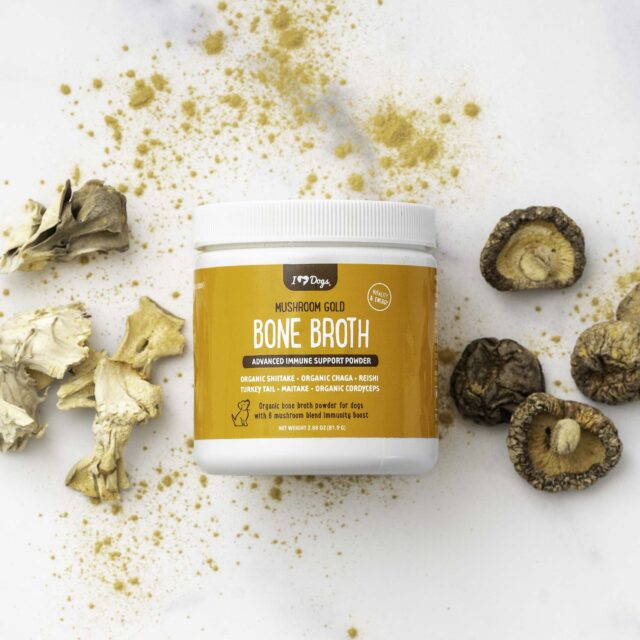




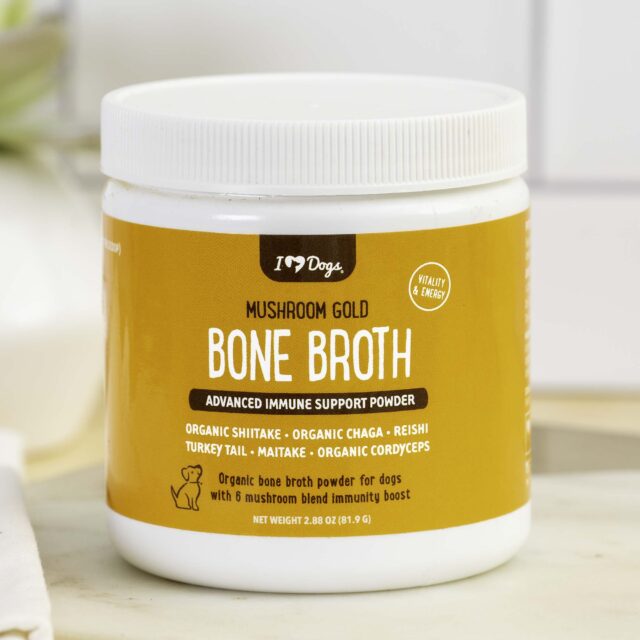
 Toledo, United States.
Toledo, United States.